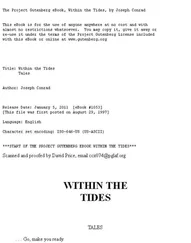Joseph Conrad - Tales of Unrest
Здесь есть возможность читать онлайн «Joseph Conrad - Tales of Unrest» — ознакомительный отрывок электронной книги совершенно бесплатно, а после прочтения отрывка купить полную версию. В некоторых случаях можно слушать аудио, скачать через торрент в формате fb2 и присутствует краткое содержание. Жанр: unrecognised, на английском языке. Описание произведения, (предисловие) а так же отзывы посетителей доступны на портале библиотеки ЛибКат.
- Название:Tales of Unrest
- Автор:
- Жанр:
- Год:неизвестен
- ISBN:нет данных
- Рейтинг книги:5 / 5. Голосов: 1
-
Избранное:Добавить в избранное
- Отзывы:
-
Ваша оценка:
- 100
- 1
- 2
- 3
- 4
- 5
Tales of Unrest: краткое содержание, описание и аннотация
Предлагаем к чтению аннотацию, описание, краткое содержание или предисловие (зависит от того, что написал сам автор книги «Tales of Unrest»). Если вы не нашли необходимую информацию о книге — напишите в комментариях, мы постараемся отыскать её.
Tales of Unrest — читать онлайн ознакомительный отрывок
Ниже представлен текст книги, разбитый по страницам. Система сохранения места последней прочитанной страницы, позволяет с удобством читать онлайн бесплатно книгу «Tales of Unrest», без необходимости каждый раз заново искать на чём Вы остановились. Поставьте закладку, и сможете в любой момент перейти на страницу, на которой закончили чтение.
Интервал:
Закладка:
Joseph Conrad
Tales of Unrest
PUBLISHER NOTES:
Quality of Life, Freedom, More time with the ones you Love.
Visit our website: LYFREEDOM.COM
AUTHOR'S NOTE
Of the five stories in this volume, "The Lagoon," the last in order, is the earliest in date. It is the first short story I ever wrote and marks, in a manner of speaking, the end of my first phase, the Malayan phase with its special subject and its verbal suggestions. Conceived in the same mood which produced "Almayer's Folly" and "An Outcast of the Islands," it is told in the same breath (with what was left of it, that is, after the end of "An Outcast"), seen with the same vision, rendered in the same method—if such a thing as method did exist then in my conscious relation to this new adventure of writing for print. I doubt it very much. One does one's work first and theorises about it afterwards. It is a very amusing and egotistical occupation of no use whatever to any one and just as likely as not to lead to false conclusions.
Anybody can see that between the last paragraph of "An Outcast" and the first of "The Lagoon" there has been no change of pen, figuratively speaking. It happened also to be literally true. It was the same pen: a common steel pen. Having been charged with a certain lack of emotional faculty I am glad to be able to say that on one occasion at least I did give way to a sentimental impulse. I thought the pen had been a good pen and that it had done enough for me, and so, with the idea of keeping it for a sort of memento on which I could look later with tender eyes, I put it into my waistcoat pocket. Afterwards it used to turn up in all sorts of places—at the bottom of small drawers, among my studs in cardboard boxes—till at last it found permanent rest in a large wooden bowl containing some loose keys, bits of sealing wax, bits of string, small broken chains, a few buttons, and similar minute wreckage that washes out of a man's life into such receptacles. I would catch sight of it from time to time with a distinct feeling of satisfaction till, one day, I perceived with horror that there were two old pens in there. How the other pen found its way into the bowl instead of the fireplace or wastepaper basket I can't imagine, but there the two were, lying side by side, both encrusted with ink and completely undistinguishable from each other. It was very distressing, but being determined not to share my sentiment between two pens or run the risk of sentimentalising over a mere stranger, I threw them both out of the window into a flower bed—which strikes me now as a poetical grave for the remnants of one's past.
But the tale remained. It was first fixed in print in the "Cornhill Magazine", being my first appearance in a serial of any kind; and I have lived long enough to see it guyed most agreeably by Mr. Max Beerbohm in a volume of parodies entitled "A Christmas Garland," where I found myself in very good company. I was immensely gratified. I began to believe in my public existence. I have much to thank "The Lagoon" for.
My next effort in short-story writing was a departure—I mean a departure from the Malay Archipelago. Without premeditation, without sorrow, without rejoicing, and almost without noticing it, I stepped into the very different atmosphere of "An Outpost of Progress." I found there a different moral attitude. I seemed able to capture new reactions, new suggestions, and even new rhythms for my paragraphs. For a moment I fancied myself a new man—a most exciting illusion. It clung to me for some time, monstrous, half conviction and half hope as to its body, with an iridescent tail of dreams and with a changeable head like a plastic mask. It was only later that I perceived that in common with the rest of men nothing could deliver me from my fatal consistency. We cannot escape from ourselves.
"An Outpost of Progress" is the lightest part of the loot I carried off from Central Africa, the main portion being of course "The Heart of Darkness." Other men have found a lot of quite different things there and I have the comfortable conviction that what I took would not have been of much use to anybody else. And it must be said that it was but a very small amount of plunder. All of it could go into one's breast pocket when folded neatly. As for the story itself it is true enough in its essentials. The sustained invention of a really telling lie demands a talent which I do not possess.
"The Idiots" is such an obviously derivative piece of work that it is impossible for me to say anything about it here. The suggestion of it was not mental but visual: the actual idiots. It was after an interval of long groping amongst vague impulses and hesitations which ended in the production of "The Nigger" that I turned to my third short story in the order of time, the first in this volume: "Karain: A Memory."
Reading it after many years "Karain" produced on me the effect of something seen through a pair of glasses from a rather advantageous position. In that story I had not gone back to the Archipelago, I had only turned for another look at it. I admit that I was absorbed by the distant view, so absorbed that I didn't notice then that the motif of the story is almost identical with the motif of "The Lagoon." However, the idea at the back is very different; but the story is mainly made memorable to me by the fact that it was my first contribution to "Blackwood's Magazine" and that it led to my personal acquaintance with Mr. William Blackwood whose guarded appreciation I felt nevertheless to be genuine, and prized accordingly. "Karain" was begun on a sudden impulse only three days after I wrote the last line of "The Nigger," and the recollection of its difficulties is mixed up with the worries of the unfinished "Return," the last pages of which I took up again at the time; the only instance in my life when I made an attempt to write with both hands at once as it were.
Indeed my innermost feeling, now, is that "The Return" is a left-handed production. Looking through that story lately I had the material impression of sitting under a large and expensive umbrella in the loud drumming of a heavy rain-shower. It was very distracting. In the general uproar one could hear every individual drop strike on the stout and distended silk. Mentally, the reading rendered me dumb for the remainder of the day, not exactly with astonishment but with a sort of dismal wonder. I don't want to talk disrespectfully of any pages of mine. Psychologically there were no doubt good reasons for my attempt; and it was worth while, if only to see of what excesses I was capable in that sort of virtuosity. In this connection I should like to confess my surprise on finding that notwithstanding all its apparatus of analysis the story consists for the most part of physical impressions; impressions of sound and sight, railway station, streets, a trotting horse, reflections in mirrors and so on, rendered as if for their own sake and combined with a sublimated description of a desirable middle-class town-residence which somehow manages to produce a sinister effect. For the rest any kind word about "The Return" (and there have been such words said at different times) awakens in me the liveliest gratitude, for I know how much the writing of that fantasy has cost me in sheer toil, in temper, and in disillusion.
J. C.
KARAIN, A MEMORY
I
We knew him in those unprotected days when we were content to hold in our hands our lives and our property. None of us, I believe, has any property now, and I hear that many, negligently, have lost their lives; but I am sure that the few who survive are not yet so dim-eyed as to miss in the befogged respectability of their newspapers the intelligence of various native risings in the Eastern Archipelago. Sunshine gleams between the lines of those short paragraphs—sunshine and the glitter of the sea. A strange name wakes up memories; the printed words scent the smoky atmosphere of to-day faintly, with the subtle and penetrating perfume as of land breezes breathing through the starlight of bygone nights; a signal fire gleams like a jewel on the high brow of a sombre cliff; great trees, the advanced sentries of immense forests, stand watchful and still over sleeping stretches of open water; a line of white surf thunders on an empty beach, the shallow water foams on the reefs; and green islets scattered through the calm of noonday lie upon the level of a polished sea, like a handful of emeralds on a buckler of steel.
Читать дальшеИнтервал:
Закладка:
Похожие книги на «Tales of Unrest»
Представляем Вашему вниманию похожие книги на «Tales of Unrest» списком для выбора. Мы отобрали схожую по названию и смыслу литературу в надежде предоставить читателям больше вариантов отыскать новые, интересные, ещё непрочитанные произведения.
Обсуждение, отзывы о книге «Tales of Unrest» и просто собственные мнения читателей. Оставьте ваши комментарии, напишите, что Вы думаете о произведении, его смысле или главных героях. Укажите что конкретно понравилось, а что нет, и почему Вы так считаете.












